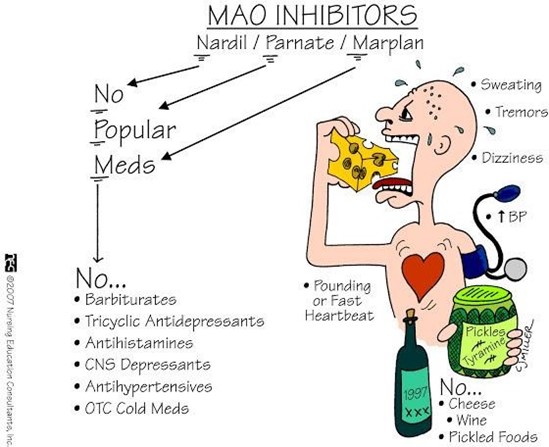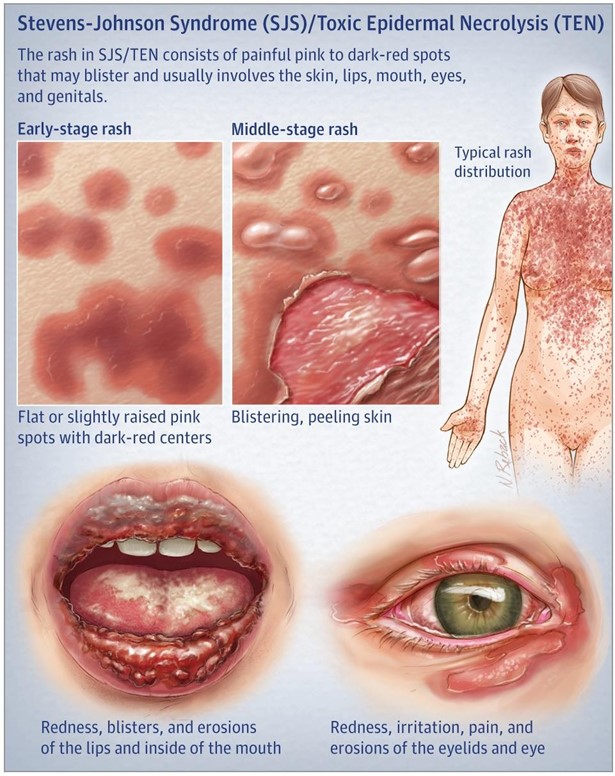A nurse is collecting data from a client who is taking tranylcypromine and reports ingestion of tyramine-rich foods.
The nurse should monitor the client for which of the following findings as an adverse effect of this medication?
Hyperglycemia
Hypertension
Hematuria,
Tinnitus
The Correct Answer is B
Explanation
B.Hypertension
Tranylcypromine is a monoamine oxidase inhibitor (MAOI) used to treat depression. One of the potential adverse effects of MAOIs is hypertensive crisis, which can be triggered by the consumption of foods high in tyramine. Tyramine-rich foods, such as aged cheeses, cured meats, certain wines, and fermented products, can cause the release of norepinephrine, leading to a sudden increase in blood pressure.
Monitoring the client for hypertension is crucial because a hypertensive crisis can be life-threatening. Signs and symptoms of hypertensive crisis may include severe headache, chest pain, palpitations, blurred vision, anxiety, and shortness of breath. If these symptoms occur, immediate medical intervention is required.
The other options are not specifically associated with the adverse effects of tranylcypromine:
Hyperglycemia in (option A) is not typically associated with tranylcypromine. However, it is important to monitor blood glucose levels in clients with pre-existing diabetes, as tranylcypromine can affect blood sugar control.
Hematuria (blood in the urine) in (option C) is not a common adverse effect of tranylcypromine.
Tinnitus (ringing in the ears) in (option D) is not a commonly reported adverse effect of tranylcypromine.

Nursing Test Bank
Naxlex Comprehensive Predictor Exams
Related Questions
Correct Answer is C
Explanation
Explanation
C. Skin rash with fever
Stevens-Johnson syndrome (SJS) is a severe and potentially life-threatening hypersensitivity reaction that can occur as a rare side effect of certain medications, including allopurinol.
Monitoring and early recognition of SJS symptoms are crucial for prompt medical.
Skin rash with fever is a hallmark manifestation of Stevens-Johnson syndrome. It often starts with flu-like symptoms such as fever and malaise, followed by the appearance of a widespread, painful, and rapidly progressing rash. The rash typically involves the mucous membranes, including the mouth, nose, and eyes, and can be accompanied by blisters or sores. Prompt reporting of these symptoms is critical for early diagnosis and intervention.
Tinnitus with ear pain in (option A) is incorrect because it is not typically associated with Stevens- Johnson syndrome. It may indicate another condition or side effect unrelated to SJS.
Hyperreflexia, which refers to abnormally increased reflexes, in (option B) is incorrect because it is not a characteristic manifestation of Stevens-Johnson syndrome. It may indicate a neurological condition or reaction to another medication, but it is not specific to SJS.
Diplopia, or double vision, in option (D) is incorrect because it is not commonly associated with Stevens- Johnson syndrome. It may be caused by other ocular or neurological conditions.
In summary, the nurse should instruct the client taking allopurinol to monitor and report the manifestation of a skin rash with fever. This is important because it may indicate the development of Stevens-Johnson syndrome, a severe and potentially life-threatening reaction to the medication. Early recognition and medical intervention are crucial to minimize complications and ensure appropriate treatment.

Correct Answer is A
Explanation
Insulin lispro is a rapid-acting insulin, while insulin glargine is a long-acting insulin. It is important to keep them separate to maintain their individual properties and avoid any potential interactions or changes in their effectiveness.
Insulin glargine is a clear solution and should not appear cloudy. Cloudiness in insulin can indicate contamination or improper storage.
The instruction to "take an extra dose of insulin lispro prior to aerobic exercise" is not recommended. The client should consult with their healthcare provider to determine if any adjustments to their insulin regimen are necessary for exercise. Typically, adjustments are made based on the individual's blood glucose levels and anticipated intensity and duration of exercise. Insulin glargine is a long-acting insulin that provides a steady release of insulin over a prolonged period, without distinct peaks or valleys in its action. Its onset of action is gradual and its effect lasts for approximately 24 hours.
It is important for the client to receive accurate and appropriate instructions regarding their insulin regimen. The nurse should clarify any misunderstandings and provide accurate information to promote safe and effective diabetes management.
Whether you are a student looking to ace your exams or a practicing nurse seeking to enhance your expertise , our nursing education contents will empower you with the confidence and competence to make a difference in the lives of patients and become a respected leader in the healthcare field.
Visit Naxlex, invest in your future and unlock endless possibilities with our unparalleled nursing education contents today
Report Wrong Answer on the Current Question
Do you disagree with the answer? If yes, what is your expected answer? Explain.
Kindly be descriptive with the issue you are facing.
